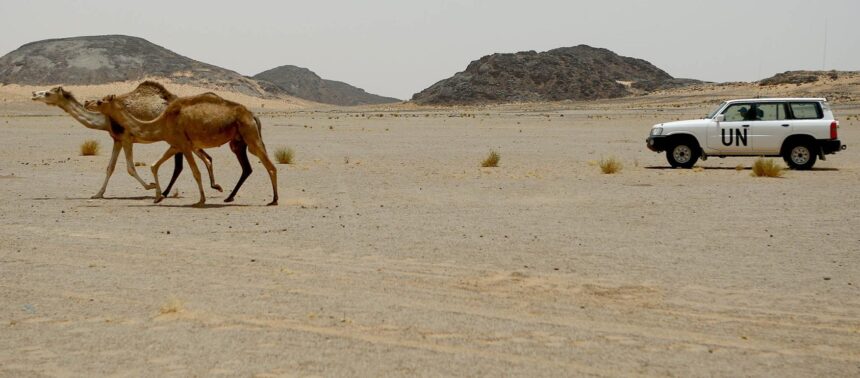The article explores how the conflict in Western Sahara has changed since France recognized Moroccan sovereignty over the territory. This recognition, combined with Morocco’s military superiority, puts pressure on the Sahrawi people and Algeria to negotiate peace.
This conflict, one of Africa’s longest-running, is nearing its end, with more and more countries supporting Morocco. The POLISARIO Front, which has been fighting for Sahrawi independence, now faces the task of securing the best possible terms within the framework of Moroccan autonomy. This is to avoid a less favorable settlement for the Sahrawi people.
Read more below.
Western Sahara’s conflict is over. Negotiating the terms comes next
One of Africa’s longest wars shifted toward a conclusion in July when France recognized Morocco’s claim of sovereignty over the Western Sahara. That action, alongside Morocco’s military advantage, effectively will leave the indigenous Sahrawi independence movement with no choice but to eventually settle for some form of autonomy within Morocco. While this reality will be unsatisfactory for the estimated 173,000 Sahrawis living in refugee camps, their best option, and that of their backer, Algeria, is now to seize the opportunity to negotiate for best-possible peace terms with Morocco. Ending a war that keeps so many stateless and living in squalor while also removing a major irritant to the Moroccan-Algerian relationship will improve regional stability.
Growing Recognition of Morocco’s Claim
In 2020, President Trump proclaimed U.S. recognition of “Moroccan sovereignty over the entire Western Sahara” as Morocco recognized Israel under the Abraham Accords. That U.S. shift supported a 2007 Moroccan proposal for Western Saharan autonomy as “the only basis for a just and lasting solution” to the Western Sahara dispute. At the time, many supporters of Sahrawi independence, including Algeria, saw Trump’s proclamation as a damaging but inconclusive turn. However, 37 nations have since followed the U.S. lead and France’s recognition is decisive.
Questions Around Morocco’s Autonomy Plan
The POLISARIO rejected Morocco’s 2007 autonomy plan, which foresaw Moroccan control over the entire territory but offered to let its people “run their affairs democratically, through legislative, executive and judicial bodies enjoying exclusive powers.” Seventeen years later, the POLISARIO’s inability to win independence militarily raises the question: What additional Moroccan concessions does the POLISARIO need to accept autonomy?
One issue is the right of return for 173,600 Sahrawi refugees living in five camps near the southwestern Algeria town of Tindouf. While Morocco’s plan promises “full integration, into the nation’s fabric, of persons to be repatriated,” the Sahrawis will certainly want more specificity on who will be welcome to return. They will want clear options for those who would choose not to return — some having never set foot inside the territory. Would the U.N. refugee agency or other aid organizations help resettle such people?
What compensation would the Sahrawis seek from Morocco for property inside the territory that they would not be able to (or would choose not to) repossess? Is there a coalition of donor states that would reimburse displaced Sahrawis? In 1948, the United Nations asked member states to provide financial support to compensate Palestinian refugees, but similar instances are rare and governments could prove reluctant to set a new precedent. Could the Sahrawi refugees be compensated through payments from proceeds of natural resources extracted from the territory?
For Sahrawis who decide to return, might they consider additional forms of autonomy within the Moroccan state? Democratic political arrangements in the MENA region like Lebanon’s confessional system or Iraq’s ethnonational quotas afford special considerations that guarantee minority representation at the national level; the Sahrawis would do well to propose appropriate accommodations. For example, could the Sahrawis demand a specific number of seats in Morocco’s parliament for Sahrawi representation? Could the Sahrawis demand that Morocco’s prime minister, who is appointed by the king, always be a Sahrawi?
The autonomy proposal offers a blanket amnesty “precluding any legal proceedings, arrest, detention, imprisonment or intimidation of any kind, based on facts covered by this amnesty.” But the plan is not specific about which Sahrawis would be covered. Would they include Sahrawis living outside the territory or those incarcerated in Morocco? Morocco holds Sahrawi pro-independence and human rights advocates in prison but does not recognize them as “political prisoners” because Moroccan courts have convicted them of criminal offenses. Surely, the POLISARIO would want to have most if not all of such Sahrawi prisoners released as part of any agreement.
Alongside demands by the Sahrawi people for ethno-national recognition and protection, other interests would need to be accommodated in any negotiated solution to the conflict: specifically, those of the current Sahrawi leadership and the Algerian government.
PHOTO: A U.N. ceasefire monitoring team stops on a patrol in the Western Sahara in 2010; 14 years later, the conflict remains militarily stalemated, but Morocco has won diplomatic advantage. (U.N. Photo/Martine Perret/CC License 2.0)
By: Thomas M. Hill
Source: USIP







